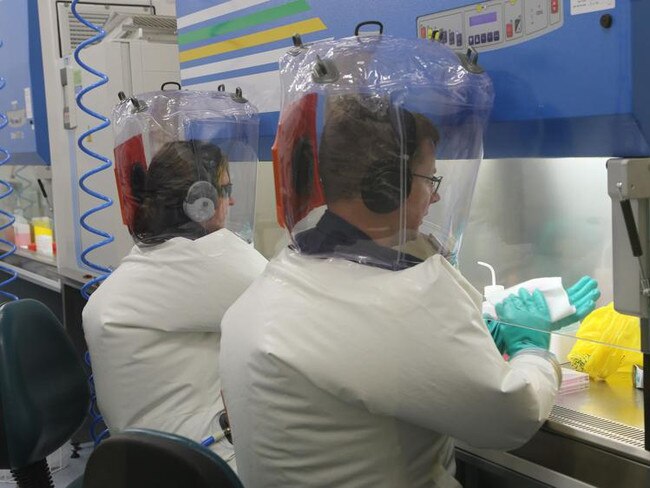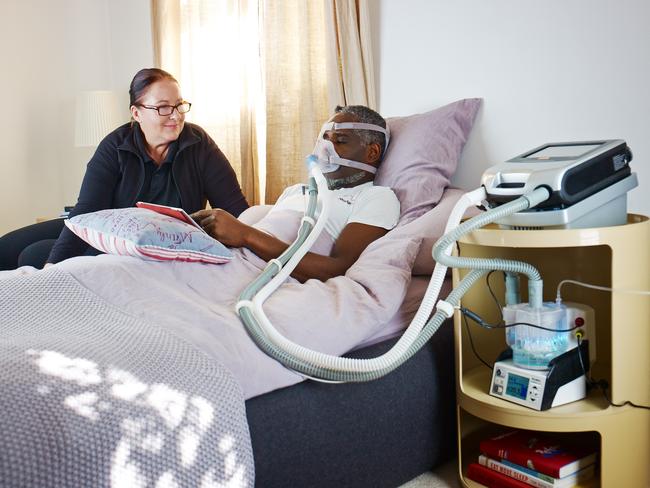CSIRO scientists in Australia start testing potential coronavirus vaccine on ferrets
Ferrets have been injected with two trial vaccines for coronavirus at CSIRO’s Geelong animal testing laboratory to test whether they are safe and effective.
- Up to 800,000 Aussies stranded overseas as virus spreads
- Baby dies of COVID-19 in USA as global cases exceed 900,000
Ferrets have been injected with two trial vaccines for coronavirus at CSIRO’s Geelong animal testing laboratory to test whether they are safe and effective.
Scientists at the lab are hoping to report the results of the trials by the end of June so the vaccines can be rushed into human clinical trials.
One of the vaccines, developed by Oxford University, uses a different type of virus to introduce proteins from the SARS-COV-2 virus which causes coronavirus into the human body to prompt an immune response.
The second vaccine, developed by US pharmaceutical company Innovio, presents part of the genetic code of the SARS-COV-2 virus into the body to prompt it to make viral proteins and stimulate an immune response.
The Oxford vaccine will be trialled on ferrets as both an injection as well as a nasal spray.
The Innovio vaccine will be given to ferrets only as an intramuscular injection.

The Innovio vaccine has already begun human trials. Healthy people were injected with the vaccine in mid-March to see whether it was safe to use.
The director of CSIRO’s Australian Animal Health Laboratory (AAHL) Professor Trevor Drew said ferrets were chosen for the trials because, like humans, they had ACE2 receptors in the cells in their lungs.
The virus which causes coronavirus binds to these receptors and uses them to infect the body.
The CSIRO was the first laboratory in the world to confirm ferrets were susceptible to the SARS virus and studied it in the animals during the SARS outbreak in 2003.
Professor Drew said a vaccine developed for the SARS outbreak in 2003 was found to produce a more severe disease in ferrets so it was important to check whether these new vaccines produced a similar problem.
If all goes well the CSIRO scientists hope we could have a vaccine ready by the end of this year or early next year.
A massive worldwide effort is behind the vaccine race with scientists around the world sharing their research and co-operating on a global scale to develop a vaccine in record time.
MORE NEWS
China’s ‘fake’ virus numbers caused global crisis, says US
COVID-19 infection rates ‘much higher than tests show’
More Wall St gloom as investors see no COVID-19 relief
The trials come after CEPI engaged CSIRO to start working on the SARS CoV-2 virus, which causes the new coronavirus, in January and CSIRO successfully establishing a biological model in February.
They are also being undertaken in conjunction with the global agency Coalition for Epidemic Preparedness Innovations (CEPI), which funds vaccine development to bring an end to pandemics.
The global group has identified vaccine candidates from The University of Oxford (UK) and Inovio Pharmaceuticals Inc. (US) to undergo the first pre-clinical trials at CSIRO, with further candidates likely to follow.
While the race to develop the vaccine is proceeding at lightening speed, it could still be 12 to 18 months before the vaccines are rolled out worldwide even if they are found to work.
HEALTH CARE WORKERS RECEIVE TUBERCULOSIS VACCINE
Three hundred health care workers have already received a tuberculosis vaccine to protect them against COVID-19 in a trial being run by The Murdoch Children’s Research Institute.
The mass vaccination campaign was announced only a week ago and already hundreds of staff have received what is hoped will be protection against the virus.
Sarah and Lachlan Murdoch have donated $700 000 to the trial which is designed to test whether the tuberculosis vaccine can boosts humans’ ‘frontline’ immunity and protect healthcare workers exposed to COVID-19 from developing severe symptoms.
The Royal Children’s Hospital Foundation has also provided a $400 000 grant towards the research.

Previous studies have found the vaccine reduces the viral load and reduces symptoms when people are infected with respiratory viruses similar to COVID-19.
Four thousand health care workers will take part in the trial with half being given the vaccine and the rest receiving a dummy vaccine to test whether the vaccine works.
MORE NEWS
Don’t ‘text the ex’ during lockdown
50 Aussie hospitals to trial malaria, HIV drug for COVID-19
Has your health fund delayed its April 1 premium rise?
There is as yet no vaccine for COVID-19 and it could be 18 months before the many vaccines in development around the world complete clinical trials.
They will have to be found to be effective, cause few side effects and then be produced on mass to vaccinate populations around the world.
The beauty of the Murdoch trial is it is repurposing an existing vaccine that has already been tested as safe for use against another disease.
Originally published as CSIRO scientists in Australia start testing potential coronavirus vaccine on ferrets
